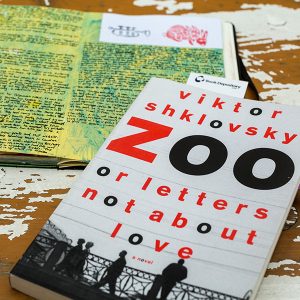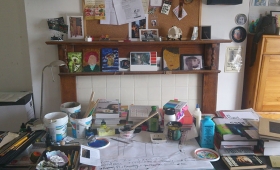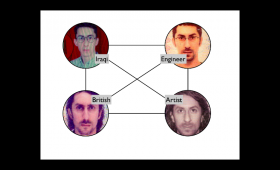 I am pleased to be invited to do a short reading at the Rabbits Road Institute library from Shklovsky’s “Zoo or Letters Not About Love” on Saturday 22 October 2016. The event is free and runs from 12:30 – 6:00pm with a wide range of activities and celebrations. For more details about the event and to reserve a space, see the Rabbits Road Institute website.
I am pleased to be invited to do a short reading at the Rabbits Road Institute library from Shklovsky’s “Zoo or Letters Not About Love” on Saturday 22 October 2016. The event is free and runs from 12:30 – 6:00pm with a wide range of activities and celebrations. For more details about the event and to reserve a space, see the Rabbits Road Institute website.
I was invited by artists Ruth Beale and Amy Feneck to nominate a book for the library, which responds to the legacy of the free public library and to workers’ education movements. The library is organised under three themes: People & Place; The Future; Making it Happen. I was asked to suggest a book for “The Future” and state why I have chosen the book.
Here is my reply:
I am honoured to be asked to nominate a book for the library, yet this feeling is overshadowed with the overwhelming feeling of which book to nominate of the many books I hold dear in my mind, heart and soul. And when/if I finally pick ONE amongst the raised hands and screams of “pick me… pick me…”, I stand helpless in front of the themes you suggested for I believe limiting a book to a theme is cutting the wings of its soul and directing the reader into one path rather than allowing them to experience it in their own meander.
Therefore, I will nominate a book and slot it in all three themes and let each reader decide where it fits: in any of the three; somewhere else; or nowhere at all.—
Viktor Shklovsky, Zoo or Letters Not About Love (a novel)
“Allow me to be sentimental. Life has hold of me in a foreign land and it does with me what it will.”
Making it Happen
The narrative, constructed through letters, is about a man who is only allowed, by the woman whom he desires, to write to her if and only if he doesn’t write about love. So instead he writes about Russia, the revolution, science, cars, friends, literature and all else but love (almost).People & Place
This book is about defying censorship (a more recent attempt was made by Jafar Panahi’s film “This is not a Film”). It resonated with me on many layers. First, having been brought up under a totalitarian regime, we learned how to defy censorship through hinting and tiptoeing around forbidden topics. On a second layer, I relate to the author’s paranoia as an immigrant, best expressed in lines such as “tell me, in what language will you speak your last words when you die?” and “Russians had discussed passports with each other just as eagerly as married women talk about childbirth”. Finally, through the author’s confession: “Alya is the realization of a metaphor. I invented a woman and love in order to make a book about misunderstanding, about alien people, about an alien land.” he leaves us in the margins between dream and awake wondering what was fiction and what was real.The Future
“Time goes, you say? Ah no!
Alas, Time stays, we go.”—



